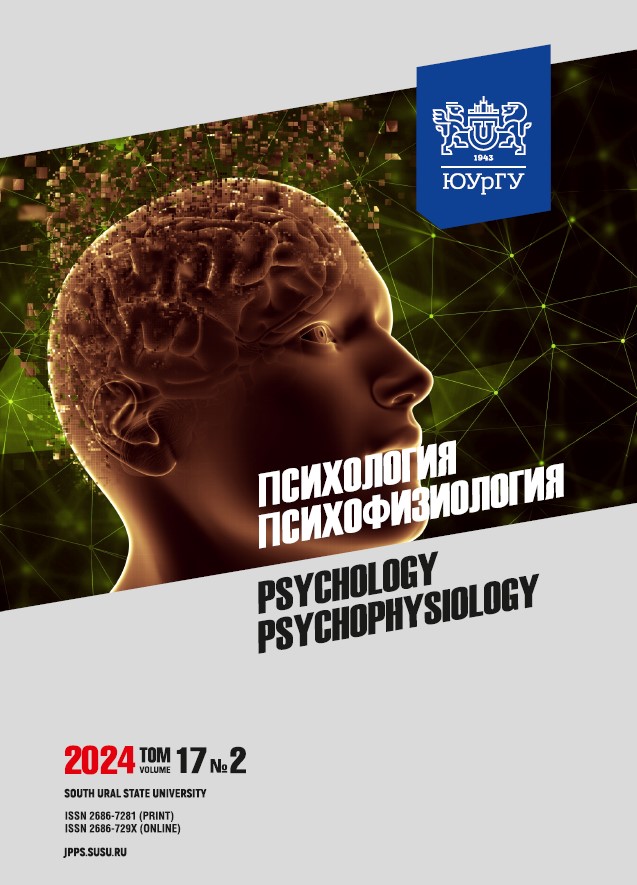Features of conflict competence among psychology students with different levels of psychological well-being
Abstract
Introduction: The contemporary landscape of higher psychological education lacks a focused approach towards enhancing the conflict resolution skills and psychological well-being of students, despite these attributes being crucial for aspiring psychologists and frequently underdeveloped upon graduation. Aims: this study aims to identify the features of conflict resolution among psychology students with different levels of psychological well-being. Materials and methods: The research involved a sample of 360 students enrolled in psychological programs across three universities within the Russian Federation. Seven psychodiagnostic methods were employed, including A.I. Tashcheva’s “Methodology for studying interpersonal perception in a conflict situation”, E.E. Tunik’s “Diagnostics of personal creativity”, E.P. Ilyin and P.A. Kovalev’s “Personal aggressiveness and conflict”, V. V. Boyko’s method for detecting obstacles in establishing emotional contacts, A.V. Karpov’s measure of personal reflexivity, the Thomas-Kilmann Conflict Mode Instrument, and the Ryff’s Psychological Well-Being Scale. Results: It was observed that students exhibiting lower psychological well-being demonstrated a higher prevalence of negative conflict resolution traits such as a negative perception of conflicts, low curiosity, risk avoidance, proneness to conflict, short temper, touchiness, and suspicion. These individuals displayed a reduced capacity for emotional effectiveness in conflict, attributed to more obstacles in establishing emotional contacts. Conversely, psychology students with high levels of psychological well-being exhibited greater reflexivity and used more constructive conflict management strategies. Conclusion: The study underscores a direct correlation between psychological well-being and the components of conflict resolution skills among psychology students. Specifically, students with better psychological well-being tend to perceive conflicts more adequately, demonstrate creativity in conflict interactions, maintain an adequate level of aggressiveness, experience fewer conflicts, favor competitive and cooperative behaviors over avoidance, and engage in deeper reflexivity regarding their behaviors and those of others.
Downloads
References
2. Verbitskii A.A., Shcherbakova O.I. Konfliktologicheskaya kultura specialista: tekhnologii formirovaniya [Conflictological culture of a specialist: technologies of formation]. Moscow. Moscow State Pedagogical University Publ. 2016:413. (in Russ.).
3. Shemyatikhin V.A., Zinkovskii A.V. The main directions and structure of professional competence of university teachers of the Ministry of Emergency Situations of Russia. Obrazovanie i nauka: izvestiya Uralskogo otdeleniya RAO = Education and Science: proceedings of the Ural Branch of the Russian Academy of Education. 2007;6:45–54. (in Russ.).
4. Belyashov V.A., Egorova T.E., Serebrovskaya N.E. Autopsychological competence and the possibility of its development in the process of university training of future specialists. Sovremennaya nauka: aktualnye problemy teorii i praktiki. Seriya: Poznanie = Modern Science: actual problems of theory and practice, a Series of “Cognition”. 2018;5(80):73–77. (in Russ.).
5. Hasan B.I., Privalihina T.I. Stanovlenie konfliktnoi kompetentnosti – rezultat obrazovatelnoi praktiki [The formation of conflict competence is the result of educational practice]. Sotsialnye konflikty (ekspertiza, prognozirovanie, tekhnologii razresheniya) [Social conflicts (expertise, forecasting, resolution technologies)]. Moscow. Editorial URSS Publ. 2004;21:136. (in Russ.).
6. Berezhnaya G.S. Methodological foundations of the formation of professional conflictological competence of a teacher. Vestnik Baltiiskogo federalnogo universiteta im. I. Kanta. Seriya: Filologiya, pedagogika, psikhologiya = IKBFUs Vestnik. Series: Philology, Pedagogy, Psychology. 2007;4: 48–52. (in Russ.).
7. Kashapov M.M., Lukina A.S., Makhnovets S.N. Structural-level organization of conflict competence in the professional activities of a manager. Vestnik Sankt-Peterburgskogo universiteta. Psihologiya = Vestnik of Saint Petersburg University. Psychology. 2023;13(2):261–278. (in Russ.). DOI: 10.21638/spbu16.2023.209
8. Kashapov M.M., Voskresenskii A.M., Kashapov A.S. Creative component of students conflict competence. Vestnik Vladimirskogo gosudarstvennogo universiteta im. Aleksandra Grigorevicha i Nikolaya Grigorevicha Stoletovyh. Seriya: Pedagogicheskie i psihologicheskie nauki = Bulletin of Vladimir State University named after A.G. and N.G. Stoletovs. Series: Pedagofical ans psychological sciences. 2022;50(69);140–155. (in Russ.).
9. Manek T.V.A. Leading Teams Through Productive Conflict Engagement. Master of Science in organizational Dynamics Theses. 2020;96:60. URL: repository.upenn.edu/handle/20.500.14332/41968 (accessed: 02.04.2024).
10. Dijkstra M.T.M., Beersma B., Cornelissen R.A.W.M. The emergence of the Activity Reduces Conflict Associated Strain (ARCAS) model: A test of a conditional mediation model of workplace conflict and employee strain. Journal of Occupational Health Psychology. 2012;17(3):365–375. DOI: 10.1037/a0028550
11. Dijkstra M.T.M., Van Dierendonck D., Evers A., De Dreu C.K.W. Conflict and well-being at work: The moderating role of personality. Journal of Managerial Psychology. 2005;20:87–104. DOI: 10.1108/ 02683940510579740
12. Rillo-Albert A., Lavega-Burgues P., Prat Q. et al. The Transformation of Conflicts into Relational Well-Being in Physical Education: GIAM Model. International journal of environmental research and public health. 2021;18(3):1071. DOI: 10.3390/ijerph18031071
13. Inguran O.V. Psychological well-being of specialists in helping professions: theoretical background of the study. Problemy nauki = Problems of science. 2019;4(40):96–104. (in Russ.).
14. Gabdulina L.I., Moskalyova N.A. Psychological well-being of psychology students at the final stage of their professional training. Mir nauki. Pedagogika i psihologiya = World of Science. Pedagogy and Psychology. 2021;9(6). URL: https://mir-nauki.com/PDF/80PSMN621.pdf (accessed: 26.06.2023) (in Russ.).
15. Borodovicyna T.O. Features of psychological well-being of students of various training profiles. Mir nauki. Pedagogika i psihologiya = World of Science. Pedagogy and Psychology. 2020;8(4). URL: https://mir-nauki.com/PDF/45PSMN420.pdf (accessed: 26.06.2023). (in Russ.).
16. Kozmina L.B. Dynamics of psychological wellbeing of students with major in psychology during their education in a higher school. Teoriya i praktika obshchestvennogo razvitiya = Theory and Practice of Social Development. 2013;11:118–120. (in Russ.).
17. Diener E., Pressman S.D., Hunter J., Delgadillo-Chase D. If, Why, and When Subjective Well-Being Influences Health, and Future Needed Research. Applied Psychology: Health and Well-Being. 2017;9(2):133–167. DOI: 10.1111/aphw.12090.
18. Dresden J., Thompson K.F. Looking Closely at Clinical Practice: A Clear-Eyed Vision for the Future of Teacher Education. Peabody Journal of Education. 2021;96(1):8–21. DOI: 10.1080/0161956X.2020.1864242
19. Pavot W. The Assessment of Subjective Well-Being: Successes and Shortfalls. Eds. M. Eid, R.J. Larsen. The Science of Subjective Well-Being. New York: The Guilford Press. 2008:124–140.
References on translit
-Copyright (c) 2024 Psychology. Psychophysiology

This work is licensed under a Creative Commons Attribution-NonCommercial-NoDerivatives 4.0 International License.



